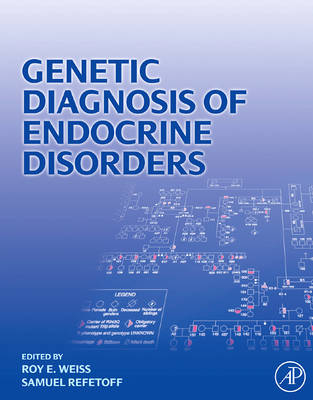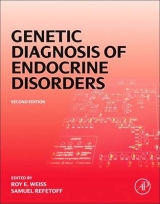
Genetic Diagnosis of Endocrine Disorders
Academic Press Inc (Verlag)
978-0-12-374430-2 (ISBN)
- Titel erscheint in neuer Auflage
- Artikel merken
Since the beginning of the current century, endocrine disease diagnosis and treatment have moved beyond the standard hormone measurements. While, indeed elevated thyroid hormone levels or low insulin levels signal a specific endocrine disease, correct diagnosis (and therefore correct treatment) depends on an understanding of the molecular basis for the disease. This book presents the "bench to bedside" approach of our understanding of the genetic basis for endocrine disease. It is organized by endocrine grouping (e.g. Thyroid, Pancreas, Parathyroid, Pituitary, Adrenal, Reproductive and Bone) and genetic/molecular basis for the diagnosis of the various disorders will be discussed. Emphasis will be placed on the practical nature of diagnosing a disease. For example: 1. Which tests should be done for the diagnosis of Diabetes mellitus Type I in children who presented at less than 6 months; at less than 12 years, in adulthood, etc., and why should those tests be done?; 2. Which genes should be evaluated for subjects with congenital hypothyroidism; 3. Which genetic tests should be ordered in obesity?; 4. Which genetic test should be ordered in a patient with Parathyroid Carcinoma?; 5. What is the rationale behind testing for Multiple Endocrine Neoplasia?
The field of genetic diagnosis of disease is exploding now, with multiple laboratories developing tests for current clinical use. Most practicing endocrinologists, pediatricians and internal medicine physicians don't understand which test to order, how the tests are done, or how to interpret the results. One of the most exciting development in medicine today is the pharmacogenomics revolution - enocrinologists and geneticists need to understand how personalized medicine will fit into the daily care of patients. While this is a quickly growing area and there are textbooks on pharmacogenomics, there is no one source for the spectrum of Endocrine diseases.
Dr. Roy Weiss joined the University of Miami Leonard M. Miller School of Medicine as Chairman and the Kathleen and Stanley Glaser Distinguished Chair in Medicine in June 2014. He is also the Rabbi Morris I. Esformes Professor Emeritus at the University of Chicago. Dr. Weiss is an expert in diseases of the thyroid and has described several genetic diseases of the thyroid along with Dr. Samuel Refetoff. Together, they have one of the largest referral centers for genetic thyroid disease in the world. His research centers on the mechanisms of thyroid hormone action at the molecular, physiological, and psychological levels. Dr. Weiss has examined the molecular basis for the syndrome of resistance to thyroid hormone (RTH) as well as other diseases of thyroid hormone action. He has published over 175 papers. He is a fellow in the American College of Physicians, The American College of Endocrinology, and the American Academy of Pediatrics. His research has been supported by the NIH and has received numerous teaching awards. He is the current President of the Central Society for Clinical and Translational Research. Samuel Refetoff is known for his discovery (1967) of resistance to thyroid hormone (Refetoff Syndrome) and elucidation of its genetic and molecular basis (1989/92). Devoted to the study of inherited thyroid disorders, his laboratory was first to identify mutations in: serum thyroid hormone transport proteins [TBG (1989) and albumin (1994)]; the TSH receptor producing resistance to TSH (1995); and two syndromic thyroid defects combining neuropsychological and thyroid abnormalities caused by mutations in the TTF1 (2002) and the MCT8 (2004) genes. In 2005 his laboratory identified a defect of TH metabolism caused by mutations in the SBP2 gene, which is involved in the synthesis of selenoproteins. A graduate of McGill University, Dr. Refetoff is professor of medicine, pediatrics and genetics at the University of Chicago. He is author of over 500 publications and recipient of numerous national and international prizes, two NIH MERIT awards (1989/2006) and three honorary doctorate degrees.
Introduction
Pancreas
Type 1 Diabetes Mellitus
MODY
Type 2 - Diabetes Mellitus
Obesity
Growth Hormones
Pituitary
Functional Adenomas
Posterior Pituitary
Thyroid
Congenital Hypothyroidism
Resistance Syndromes
Thyroid Cancer
Parathyroid and Bone
Adenomas
Cancer
Metabolic Bone Diseases
Vitamin D Disorders
Adrenal
Congenital Adrenal Hyperplasias
Adrenal tumors and cancers
Pheos and MEN II
Reproductive
Ovarian Disease
Hypogonadism
Sexual Differentiation and Puberty
Genetic Counseling for the Endocrinologists
Pharmacogenomics and Endocrine Disease
Setting up an Endocrine Genetic Laboratory
Tables of Oligos and Diseases
| Erscheint lt. Verlag | 3.6.2010 |
|---|---|
| Verlagsort | San Diego |
| Sprache | englisch |
| Maße | 216 x 276 mm |
| Gewicht | 1220 g |
| Themenwelt | Medizin / Pharmazie ► Medizinische Fachgebiete |
| Studium ► 1. Studienabschnitt (Vorklinik) ► Biochemie / Molekularbiologie | |
| ISBN-10 | 0-12-374430-X / 012374430X |
| ISBN-13 | 978-0-12-374430-2 / 9780123744302 |
| Zustand | Neuware |
| Informationen gemäß Produktsicherheitsverordnung (GPSR) | |
| Haben Sie eine Frage zum Produkt? |
aus dem Bereich



